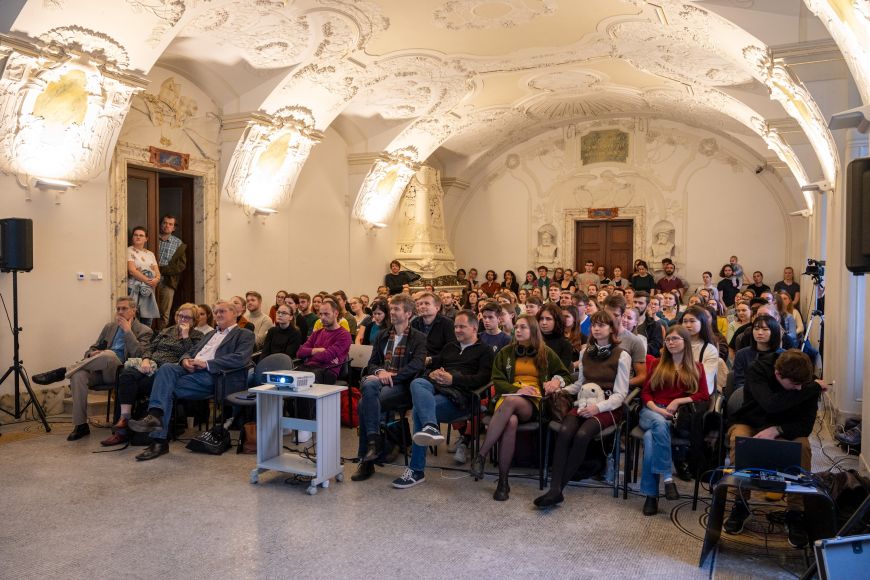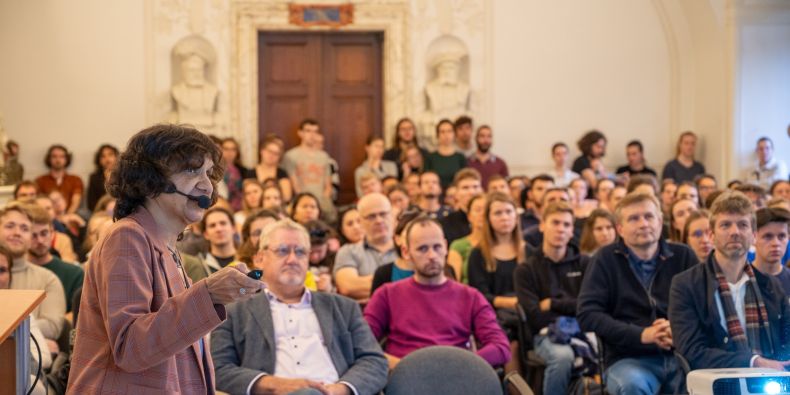The MUNI Seminar Series lectures, held in English, offer a unique opportunity to meet the world's leading scientists, including Nobel laureates and other eminent personalities. Although they are primarily intended for postgraduate students and academics at Masaryk University, in most cases they are also open to all interested professionals. They are held in three thematic areas: Life Sciences, Mathematics, Physics & Computer Science and Social Sciences & Humanities. Lectures are usually held in the refectory of the Augustinian Abbey in Brno.
The themes in all sections reflect the importance of interdisciplinary collaboration between researchers. In the Social Sciences & Humanities section, Sociologist Emily C. Dore and economist Michal Horný (10 April) will speak about how these disciplines approach the topic of population health and health equity in the United States. The lecture will be followed by a debate moderated by Jakub Hlávka, Head of Health Economics, Policy and Innovation Institute at the Faculty of Economics and Administration of Masaryk University.
“It will be a pleasure for me personally to lead the discussion with Emily Dore and Michal Horný. They are experts from Emory University in Atlanta, USA, who have been working on the topic of public health from the perspective of sociology and economics with great passion and expertise for a long time. Their presentation will be an exceptional opportunity to hear why collaboration between experts from different disciplines is important and what interesting research in this field can bring to us all,” said Jakub Hlávka. Health economics is a field that examines the management of limited human, technological and financial resources in healthcare and can positively impact society. While it is well established abroad, in the Czech Republic it is still an emerging field.
“Its importance lies primarily in its impact on the development of public health policy. At the same time, it helps clinical experts make decisions about access to healthcare that lead to the best possible outcomes for individual patients and for society as a whole. It is therefore important that clinicians work with economists, sociologists, bioethicists and other researchers. Together, they can look for ways to improve population health through targeted investments,” explained Jakub Hlávka. He believes this is the field of the future as the population ages and governments look for ways to provide dignified and good care for a growing number of elderly people. “Health economists will play a central role in deciding how to set up health and social systems to achieve the best possible outcomes with limited resources,” adds Jakub Hlávka.
Within the Mathematics, Physics & Computer Science section, lectures by two leading mathematicians were scheduled for the spring semester, one of which has already taken place. “Professor Bojan Mohar of Canada’s Simon Fraser University focuses on graph theory, which has many applications in modern computer science. His talk in March was on random embeddings of graphs in surfaces. Professor Mohar is a Fellow of the Royal Society of Canada, the highest honour a scientist can achieve in Canada. He recently became one of the principal investigators of the interdisciplinary ERC Synergy Grant KARST, which focuses on the study of water movement in karst regions,” explained Daniel Kráľ from the Department of Computer Science at MU Faculty of Informatics.
The first-ever joint MUNI Seminar Series lecture, combining Mathematics, Physics & Computer Science with Life Sciences, will take place on 17 April. The speaker, Professor Kathryn Hess of EPFL, Switzerland, is a member of the Swiss Academy of Engineering Sciences and is interested in homotopy theory and category theory. “Kathryn Hess will present the use of algebraic topology methods in network analysis and will also describe her work within the Blue Brain Project, which aims to create a physiologically accurate model of the mammalian brain and thus contribute to the understanding of higher brain functions,” added Daniel Kráľ.
As part of the Life Sciences section, the prestigious Mendel Lectures have been held for more than twenty years, focusing mainly on genetics. Brno has so far welcomed over 140 top scientists, including sixteen Nobel laureates. In the historic setting where genetics pioneer Johann Gregor Mendel conducted his groundbreaking experiments, two Nobel laureates will speak this April – Randy W. Schekman (18 April) and Thomas R. Cech (25 April). Randy W. Schekman is a professor of cell biology at the University of California, USA, and a member of the Howard Hughes Medical Institute, America’s largest private biomedical research organisation. Professor of Biochemistry Thomas R. Cech was President of the organisation from 2000-2009. He is now a researcher and lecturer at the University of Colorado Boulder.

The MUNI seminar series enables students and researchers to establish professional contacts, promote networking and thus enhance the scientific reputation and international standing of Masaryk University. Among other things, their aim is to involve and enrich the scientific community, share knowledge, encourage creativity and promote mutual contacts and joint discussions between faculties and institutes within the University. They are an ideal place for interdisciplinary cooperation, providing students and scientists with knowledge and inspiration, as well as new insights into issues in fields they are not directly involved in.
The selection of speakers for the MUNI seminar series is often finalised a year in advance. Speakers are nominated by faculties and selected by committees of faculty researchers. The entire series is organised by the Masaryk University Research and Development Office. Thanks to the long-term preparation of this unique project, it has been possible to bring leading figures in their respective fields to Brno. Visits by prominent personalities are also expected in the coming years.
Links to lectures from previous years can be found here.
Some lectures are recorded and posted on the MUNI Seminar Series YouTube channel.
